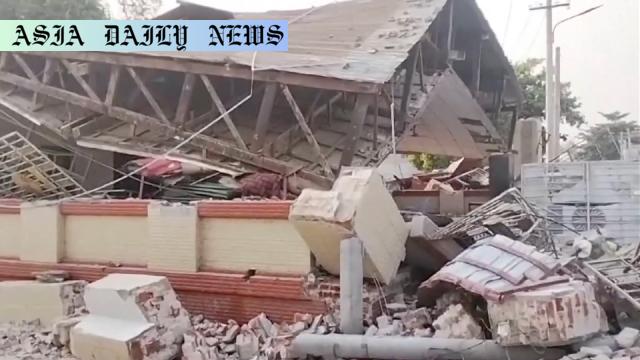Ceasefire: Myanmar’s ruling military declared a temporary halt to hostilities to aid in earthquake relief efforts nationwide.
Myanmar’s military announces a ceasefire until April 22 to aid earthquake recovery.
Pro-democracy National Unity Government agrees to a temporary cessation of hostilities.
A devastating earthquake has claimed 3,003 lives, injuring 4,515, with efforts underway for reconstruction and relief.

Introduction to Myanmar’s Ceasefire Announcement
Myanmar’s state-run television recently disclosed a significant move by the country’s military junta: a ceasefire declared from this Wednesday until April 22. Positioned as a response to the devastating earthquake that hit the nation on Friday, the ceasefire aims to create space for relief and reconstruction efforts amidst one of the most challenging moments for Myanmar this year. The announcement has garnered mixed reactions from various factions but has largely been welcomed as an opportunity to alleviate the suffering caused by the disaster.
Earthquake Devastation and Its Aftermath
The earthquake struck a devastating chord across Myanmar, leaving a staggering death toll of 3,003 while injuring 4,515 individuals. State-run media has also reported that 351 others are still missing, amplifying the urgency for nationwide recovery efforts. Entire communities have been displaced, critical infrastructure has been demolished, and overwhelming pressure is mounting on rescue and relief teams to meet surging demands. This calamity has served as the immediate impetus for the junta’s rare conciliatory gesture, temporarily aligning them with the broader humanitarian focus in the country.
Pro-democracy Camp’s Response to Ceasefire
The National Unity Government (NUG), representing Myanmar’s pro-democracy faction, has also issued its agreement to suspend hostilities for two weeks. Their commitment suggests a willingness to prioritize the humanitarian crisis over their ongoing political struggle with the military. Whether this mutual decision can sow seeds of prolonged peace remains speculative; however, the coordinated pause allows much-needed relief work and some respite for war-weary civilians caught in the disputes.
Expectations for Relief and Reconstruction Efforts
Myanmar’s post-earthquake recovery is a colossal task, given the extent of displacement and destruction. Thousands require immediate medical aid, shelter, and food, as well as psychological support for trauma recovery. The ceasefire offers a fleeting window of opportunity for both local and international humanitarian organizations to operate without interference. Yet, questions linger about the adequacy of military-led relief operations and whether they can genuinely address the scale of public demands. Transparency in these operations will be crucial in fostering both domestic and international trust.
Potential Implications of the Ceasefire
While the declared truce focuses on relief efforts, its political implications cannot be underestimated. The temporary ceasefire might open dialogue pathways between the military junta and various opposition groups, including ethnic insurgents and democracy activists. However, past patterns suggest cautious optimism, as similar efforts have faltered due to deep-rooted mistrust and diverging goals. For now, the ceasefire could serve as a small step toward de-escalating tensions in an otherwise fraught political landscape.
Conclusion
The temporary ceasefire in Myanmar, initiated in the aftermath of an unparalleled natural disaster, reflects a rare moment of unity amid division. With 3,003 lives already lost and thousands more grappling with the quake’s aftermath, this truce provides a critical lifeline for the country. However, whether this peace can extend beyond April 22 and catalyze greater national stability remains uncertain. For now, Myanmar and its citizens hold onto this moment of pause as an opportunity to rebuild lives.



Commentary
A Significant Yet Limited Opportunity for Myanmar
Myanmar’s temporary ceasefire is a remarkable step considering the enduring conflict between its ruling military and pro-democracy factions. In the wake of such a devastating earthquake, collaboration among all parties is crucial to aid shattered communities. The military’s decision and the agreement from the National Unity Government to cease hostilities reflect a glimmer of hope amidst despair. This pause can potentially rebuild not only infrastructure but also fractured human connections across the nation.
Challenges in Making Relief Efforts Effective
While the announcement conveys positive intentions on paper, its real-world implementation remains to be closely monitored. Past instances of military-dominated initiatives have been marred by inefficiency, lack of transparency, and preferential treatment favoring aligned groups. For this truce to be effective, the junta must exhibit genuine concern for the welfare of all affected citizens, irrespective of political or ethnic backgrounds. Equally, the role of international humanitarian organizations will be pivotal in ensuring that aid reaches those in dire need.
Can the Ceasefire Spur Political Progress?
Myanmar’s history is replete with fleeting truces that failed to evolve into lasting peace agreements. The question now arises: can this temporary collaboration over humanitarian relief translate into more meaningful dialogue? The plight of affected citizens might inspire decision-makers to consider the broader benefits of cooperation over adversarial politics. However, given the entrenched power dynamics and deep mistrust, it’s unlikely that long-term reconciliation will emerge solely from this ceasefire.
Final Thoughts
Despite its limitations, the ceasefire marks an extraordinary moment for Myanmar. It shows the capacity of even the most divided factions to prioritize humanity above discord in times of unprecedented need. If nothing else, this collective response to the earthquake underscores the resilience of Myanmar’s people and the urgent need for ongoing international support. It is a thread of hope for a nation yearning for stability, dignity, and peace.